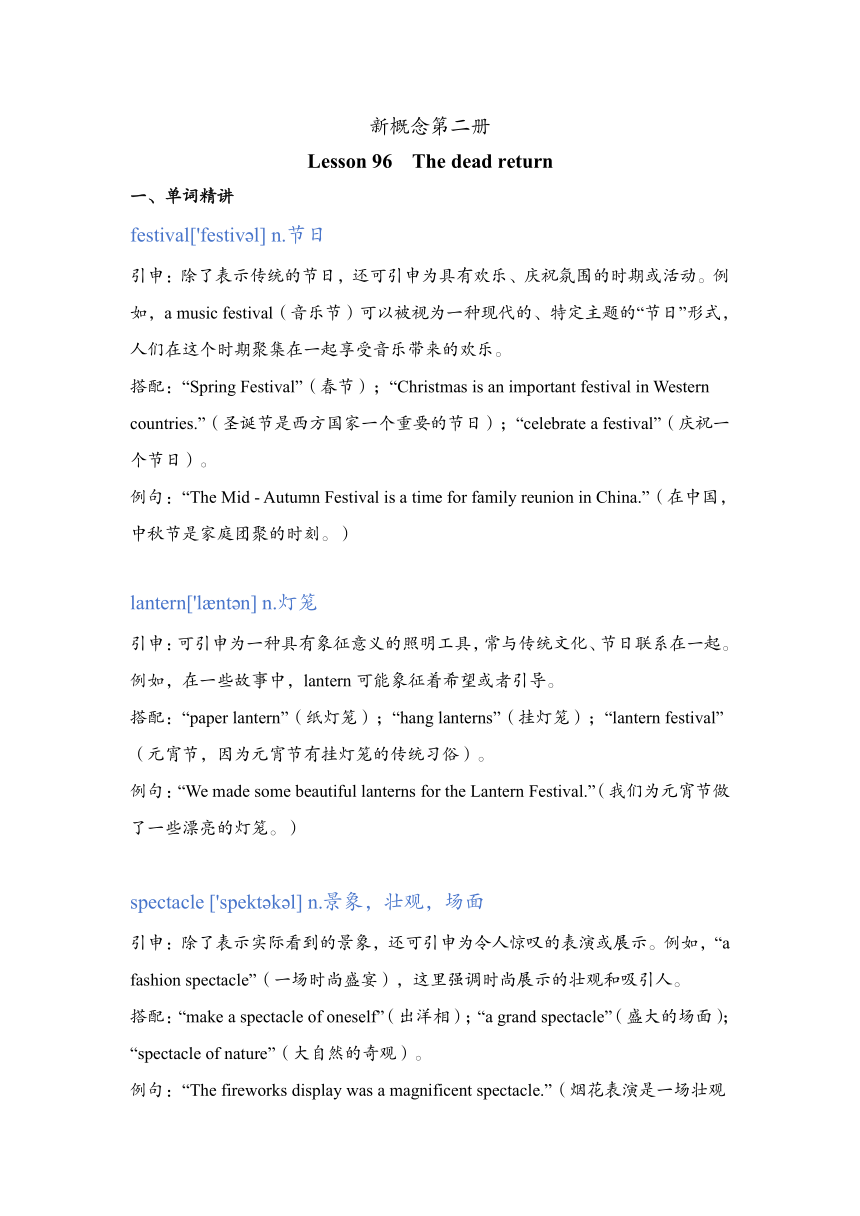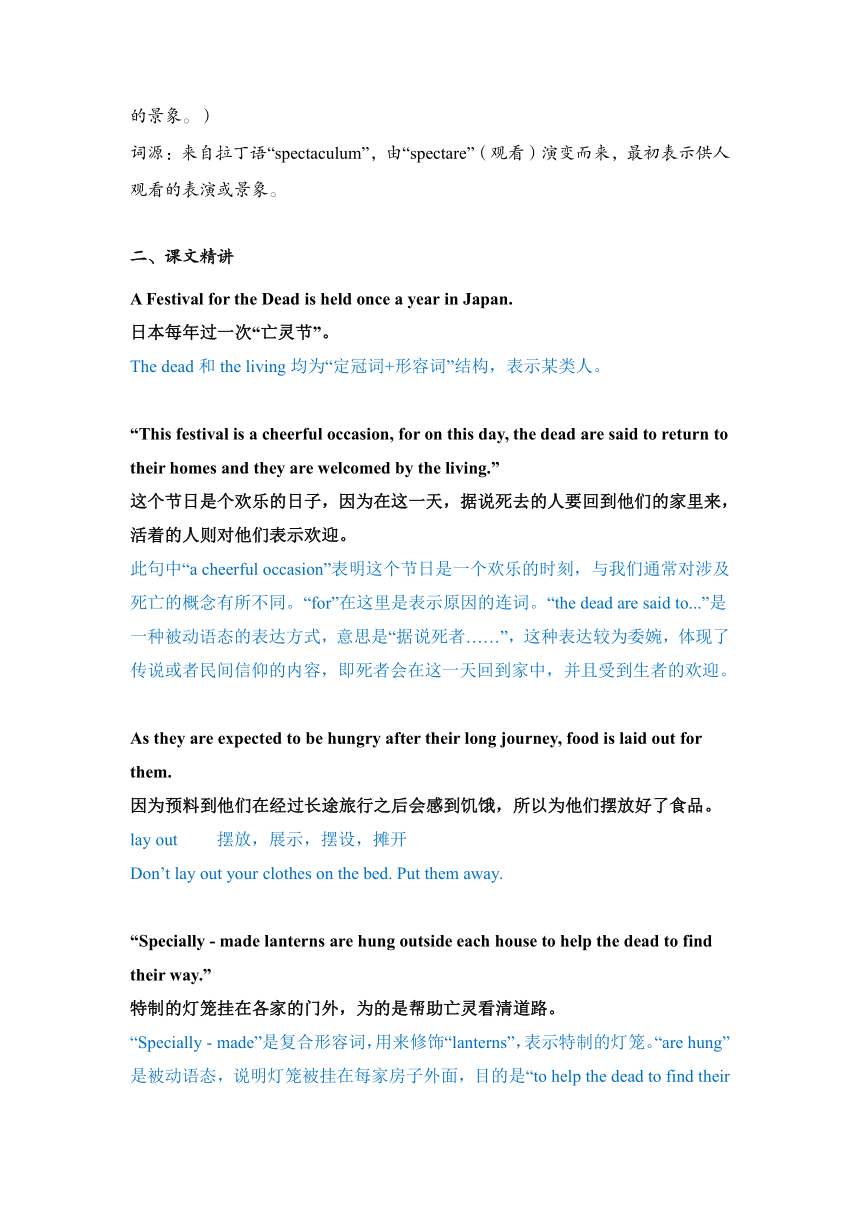新概念第二册Lesson 96 The dead return讲义
文档属性
| 名称 | 新概念第二册Lesson 96 The dead return讲义 |  | |
| 格式 | docx | ||
| 文件大小 | 73.6KB | ||
| 资源类型 | 教案 | ||
| 版本资源 | 新概念英语 | ||
| 科目 | 英语 | ||
| 更新时间 | 2024-11-26 11:28:45 | ||
图片预览


文档简介
新概念第二册
Lesson 96 The dead return
单词精讲
festival['festiv l] n.节日
引申:除了表示传统的节日,还可引申为具有欢乐、庆祝氛围的时期或活动。例如,a music festival(音乐节)可以被视为一种现代的、特定主题的“节日”形式,人们在这个时期聚集在一起享受音乐带来的欢乐。
搭配:“Spring Festival”(春节);“Christmas is an important festival in Western countries.”(圣诞节是西方国家一个重要的节日);“celebrate a festival”(庆祝一个节日)。
例句:“The Mid - Autumn Festival is a time for family reunion in China.”(在中国,中秋节是家庭团聚的时刻。)
lantern['l nt n] n.灯笼
引申:可引申为一种具有象征意义的照明工具,常与传统文化、节日联系在一起。例如,在一些故事中,lantern可能象征着希望或者引导。
搭配:“paper lantern”(纸灯笼);“hang lanterns”(挂灯笼);“lantern festival”(元宵节,因为元宵节有挂灯笼的传统习俗)。
例句:“We made some beautiful lanterns for the Lantern Festival.”(我们为元宵节做了一些漂亮的灯笼。)
spectacle ['spekt k l] n.景象,壮观,场面
引申:除了表示实际看到的景象,还可引申为令人惊叹的表演或展示。例如,“a fashion spectacle”(一场时尚盛宴),这里强调时尚展示的壮观和吸引人。
搭配:“make a spectacle of oneself”(出洋相);“a grand spectacle”(盛大的场面);“spectacle of nature”(大自然的奇观)。
例句:“The fireworks display was a magnificent spectacle.”(烟花表演是一场壮观的景象。)
词源:来自拉丁语“spectaculum”,由“spectare”(观看)演变而来,最初表示供人观看的表演或景象。
课文精讲
A Festival for the Dead is held once a year in Japan.
日本每年过一次“亡灵节”。
The dead和the living均为“定冠词+形容词”结构,表示某类人。
“This festival is a cheerful occasion, for on this day, the dead are said to return to their homes and they are welcomed by the living.”
这个节日是个欢乐的日子,因为在这一天,据说死去的人要回到他们的家里来,活着的人则对他们表示欢迎。
此句中“a cheerful occasion”表明这个节日是一个欢乐的时刻,与我们通常对涉及死亡的概念有所不同。“for”在这里是表示原因的连词。“the dead are said to...”是一种被动语态的表达方式,意思是“据说死者……”,这种表达较为委婉,体现了传说或者民间信仰的内容,即死者会在这一天回到家中,并且受到生者的欢迎。
As they are expected to be hungry after their long journey, food is laid out for them.
因为预料到他们在经过长途旅行之后会感到饥饿,所以为他们摆放好了食品。
lay out 摆放,展示,摆设,摊开
Don’t lay out your clothes on the bed. Put them away.
“Specially - made lanterns are hung outside each house to help the dead to find their way.”
特制的灯笼挂在各家的门外,为的是帮助亡灵看清道路。
“Specially - made”是复合形容词,用来修饰“lanterns”,表示特制的灯笼。“are hung”是被动语态,说明灯笼被挂在每家房子外面,目的是“to help the dead to find their way”,即为了帮助死者找到回家的路。
All night long, people dance and sing.
整个夜晚人们载歌载舞。
all night long 整夜(long为副词,表示“整个,在整段期间中”,常与all连用)
It snowed all day long.
She stayed with her grandfather all summer long.
“In the early morning, the food that had been laid out for the dead is thrown into a river or into the sea as it is considered unlucky for anyone living to eat it.”
一大早,人们便把为死者摆放的食品扔进河中或海里,因为人们认为活着的人吃了这些东西是不吉利的。
“In the early morning”点明时间是清晨。“the food that had been laid out for the dead”是一个定语从句,其中“had been laid out”是过去完成时的被动语态,表示之前为死者摆放的食物。“is thrown”是一般现在时的被动语态,表示食物被扔到河里或者海里,原因是“it is considered unlucky for anyone living to eat it”,即生者吃这些食物被认为是不吉利的。
“In towns that are near the sea, the tiny lanterns which had been hung in the streets the night before, are placed into the water when the festival is over.”
。在靠海的城镇中,头天夜里挂在大街小巷的小灯笼在节后就放在了水里。
在这个句子中,“In towns that are near the sea”描述地点,是在靠近海边的城镇。“the tiny lanterns which had been hung in the streets the night before”是一个带有定语从句的名词短语,“had been hung”是过去完成时的被动语态,表示前一晚被挂在街上的小灯笼。“are placed”是一般现在时的被动语态,表示这些灯笼在节日结束时被放到水里。
Thousands of lanterns slowly drift out to sea guiding the dead on their return journey to the other world.
成千上万只灯笼慢慢漂向大海,指引着亡灵返回另一个世界。
the other world 另一个世界,即阴间
She believes that she will meet her dead parents in the other world.
the next world = the world to come 来世
This is a moving spectacle, for crowds of people stand on the shore watching the lanterns drifting away until they can be seen no more.
moving adj. 动人的,感人的
a moving spectacle 一个感人的场面
“This is a moving spectacle, for crowds of people stand on the shore watching the lanterns drifting away until they can be seen no more.”
这是一个感人的场面,人们成群地伫立在海岸上,注视着灯笼远去,直到再也看不见为止。
“a moving spectacle”表示一个感人的景象。“for”引导原因状语从句,解释为什么这是一个感人的景象,因为成群的人站在岸边看着灯笼漂走直到看不见为止,“watching the lanterns drifting away”是现在分词短语作伴随状语。
Lesson 96 The dead return
单词精讲
festival['festiv l] n.节日
引申:除了表示传统的节日,还可引申为具有欢乐、庆祝氛围的时期或活动。例如,a music festival(音乐节)可以被视为一种现代的、特定主题的“节日”形式,人们在这个时期聚集在一起享受音乐带来的欢乐。
搭配:“Spring Festival”(春节);“Christmas is an important festival in Western countries.”(圣诞节是西方国家一个重要的节日);“celebrate a festival”(庆祝一个节日)。
例句:“The Mid - Autumn Festival is a time for family reunion in China.”(在中国,中秋节是家庭团聚的时刻。)
lantern['l nt n] n.灯笼
引申:可引申为一种具有象征意义的照明工具,常与传统文化、节日联系在一起。例如,在一些故事中,lantern可能象征着希望或者引导。
搭配:“paper lantern”(纸灯笼);“hang lanterns”(挂灯笼);“lantern festival”(元宵节,因为元宵节有挂灯笼的传统习俗)。
例句:“We made some beautiful lanterns for the Lantern Festival.”(我们为元宵节做了一些漂亮的灯笼。)
spectacle ['spekt k l] n.景象,壮观,场面
引申:除了表示实际看到的景象,还可引申为令人惊叹的表演或展示。例如,“a fashion spectacle”(一场时尚盛宴),这里强调时尚展示的壮观和吸引人。
搭配:“make a spectacle of oneself”(出洋相);“a grand spectacle”(盛大的场面);“spectacle of nature”(大自然的奇观)。
例句:“The fireworks display was a magnificent spectacle.”(烟花表演是一场壮观的景象。)
词源:来自拉丁语“spectaculum”,由“spectare”(观看)演变而来,最初表示供人观看的表演或景象。
课文精讲
A Festival for the Dead is held once a year in Japan.
日本每年过一次“亡灵节”。
The dead和the living均为“定冠词+形容词”结构,表示某类人。
“This festival is a cheerful occasion, for on this day, the dead are said to return to their homes and they are welcomed by the living.”
这个节日是个欢乐的日子,因为在这一天,据说死去的人要回到他们的家里来,活着的人则对他们表示欢迎。
此句中“a cheerful occasion”表明这个节日是一个欢乐的时刻,与我们通常对涉及死亡的概念有所不同。“for”在这里是表示原因的连词。“the dead are said to...”是一种被动语态的表达方式,意思是“据说死者……”,这种表达较为委婉,体现了传说或者民间信仰的内容,即死者会在这一天回到家中,并且受到生者的欢迎。
As they are expected to be hungry after their long journey, food is laid out for them.
因为预料到他们在经过长途旅行之后会感到饥饿,所以为他们摆放好了食品。
lay out 摆放,展示,摆设,摊开
Don’t lay out your clothes on the bed. Put them away.
“Specially - made lanterns are hung outside each house to help the dead to find their way.”
特制的灯笼挂在各家的门外,为的是帮助亡灵看清道路。
“Specially - made”是复合形容词,用来修饰“lanterns”,表示特制的灯笼。“are hung”是被动语态,说明灯笼被挂在每家房子外面,目的是“to help the dead to find their way”,即为了帮助死者找到回家的路。
All night long, people dance and sing.
整个夜晚人们载歌载舞。
all night long 整夜(long为副词,表示“整个,在整段期间中”,常与all连用)
It snowed all day long.
She stayed with her grandfather all summer long.
“In the early morning, the food that had been laid out for the dead is thrown into a river or into the sea as it is considered unlucky for anyone living to eat it.”
一大早,人们便把为死者摆放的食品扔进河中或海里,因为人们认为活着的人吃了这些东西是不吉利的。
“In the early morning”点明时间是清晨。“the food that had been laid out for the dead”是一个定语从句,其中“had been laid out”是过去完成时的被动语态,表示之前为死者摆放的食物。“is thrown”是一般现在时的被动语态,表示食物被扔到河里或者海里,原因是“it is considered unlucky for anyone living to eat it”,即生者吃这些食物被认为是不吉利的。
“In towns that are near the sea, the tiny lanterns which had been hung in the streets the night before, are placed into the water when the festival is over.”
。在靠海的城镇中,头天夜里挂在大街小巷的小灯笼在节后就放在了水里。
在这个句子中,“In towns that are near the sea”描述地点,是在靠近海边的城镇。“the tiny lanterns which had been hung in the streets the night before”是一个带有定语从句的名词短语,“had been hung”是过去完成时的被动语态,表示前一晚被挂在街上的小灯笼。“are placed”是一般现在时的被动语态,表示这些灯笼在节日结束时被放到水里。
Thousands of lanterns slowly drift out to sea guiding the dead on their return journey to the other world.
成千上万只灯笼慢慢漂向大海,指引着亡灵返回另一个世界。
the other world 另一个世界,即阴间
She believes that she will meet her dead parents in the other world.
the next world = the world to come 来世
This is a moving spectacle, for crowds of people stand on the shore watching the lanterns drifting away until they can be seen no more.
moving adj. 动人的,感人的
a moving spectacle 一个感人的场面
“This is a moving spectacle, for crowds of people stand on the shore watching the lanterns drifting away until they can be seen no more.”
这是一个感人的场面,人们成群地伫立在海岸上,注视着灯笼远去,直到再也看不见为止。
“a moving spectacle”表示一个感人的景象。“for”引导原因状语从句,解释为什么这是一个感人的景象,因为成群的人站在岸边看着灯笼漂走直到看不见为止,“watching the lanterns drifting away”是现在分词短语作伴随状语。
同课章节目录
